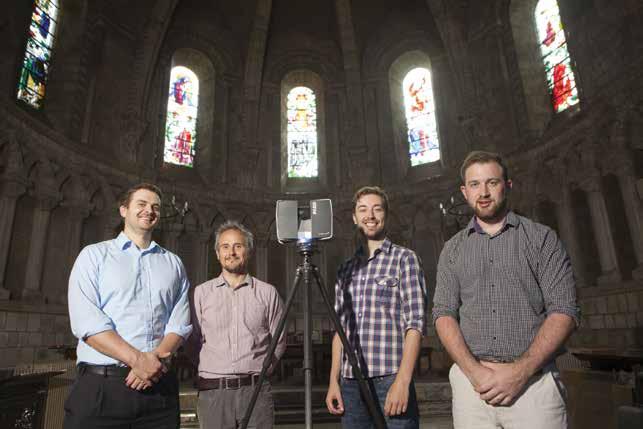
6 minute read
FACT FILE
The largest and most populous country in South America
The fifth largest and most populous country in the world
Brazil is a former colony of Portugal and gained its independence in 1822
It remains the largest Portuguese speaking nation in the world
Brazil was governed almost exclusively under military rule until 1985
It has the largest Catholic population in the world
Brazil hosted the 2014 World Cup and will host the 2016 Olympics
One of the world’s top ten sources of international students has been extremely successful for our university and we are very proud to be one of the leading providers of Higher Education in Hong Kong – one of the world’s most thriving cosmopolitan cities. collaborations and knowledge sharing. Agreements have been signed with Brazil’s Universidade de Sao Paulo, Universidade Federal de Sao Paulo, Estacio de Sa, and the Universidade Federal de Pernambuco, building on a 10-year student exchange programme with Mexico_Universidad Iberoamerica, which has also boosted Northumbria’s profile in the region. There are also exchange agreements in place with Chile’s Universidad de Chile and Colombia’s Universidad de Los Andes. This commitment to working with prestigious partners overseas, combined with the University’s global reputation as a hallmark for highquality, has resulted in a steady growth in the numbers of Latin American students coming to Northumbria. And importantly, when they do come here they are really enjoying the Northumbria experience.
Why is it so important for Northumbria University to have an international footprint?
Why is studying at an English university, and Northumbria in particular, so appealing to international students?
In the main, we partner up with public and private universities. This provides opportunities for academic and student exchanges and liaisons as well as research exchange agreements where we can explore shared academic and student interests. This leads to a rich and positive learning environment for our students, further enhancing their graduate employability.
Have we identified any new markets for international expansion/development?
How do we guarantee that students studying Northumbria programmes via partner institutions are having the same high-quality experience as those on campus?
We regularly undergo a rigorous Quality Assurance process for all of our collaborative ventures – with external auditors from the Quality Assurance Agency ensuring that the same high-standards are applied whether a student is studying in Newcastle or overseas. All of this information is publically available via the internet – further enhancing the prestige and global confidence in UK Higher Education.
“Latin Americans, particularly those from developed countries, are generally very sociable and outgoing,” says Northumbria’s International Partnerships Manager Alejandra Vicencio. “They learn English quickly and have a very positive opinion of the UK. They love Newcastle and settle in quickly.”
Alejandra added: “Northumbria has more than 60 students from Latin America on campus and we expect this number to continue growing rapidly.
We have collaborations with some of Latin America’s finest institutions, including the Universidade de Sao Paulo, which has been ranked as one of the top 100 universities in the world.
“Our Latin American working group meets twice a year to discuss how we will continue to grow our presence in these countries and bring more students to the UK in the future. We visit Brazil twice a year to attend recruitment fairs and other key events, and we have extensive links between academics. There are also strong relationships in Chile, Columbia and Mexico, and we will shortly be visited by the Dean of the Business School from Universidad de Chile.
“We will see more and more Brazilian and Latin American students on campus in the coming years and that’s a great thing for both the students and the University.”
Northumbria’s ambitious globalisation plans clearly match Brazil’s own vision for its students to become global graduates. And with so much in common, the University’s relationship with Latin America can only continue to grow stronger.
Now, who’s for samba?
Universities thrive when they attract the world’s brightest minds to both study and teach on their programmes; to push the boundaries of our thinking and to challenge the status quo. By attracting high-quality students and academics to our university, we ensure that Northumbria is a recognised hallmark for high-quality education and academic research throughout the world.
It is often said that the world is becoming a much smaller place. With modern technology and faster transport networks, the economies of the world have become interdependent and international boundaries have ceased to be the barriers they once were for businesses.
Students graduating from our courses become ‘Global Graduates’ – competing in a global labour market for graduate jobs. We take our responsibility to give our students the best opportunities to succeed in their lives very seriously. We do this through quality partnerships and collaborations with universities and businesses around the world and we are very proud of our track record in this area.
British Higher Education is quite rightly regarded as one of the best in the world – largely due to the fact this it is so publically scrutinised against very exacting standards. As a result, students coming to study at British universities are assured that they will receive a highquality education.
We also benefit from English being the global language of business, so students can expect to increase their prospects in accessing the global labour market while helping to prepare themselves for the world of work.
Northumbria’s reputation for the quality of our teaching, research strengths and expansive links to industry – coupled with a base in two of the best cities for students in the UK, Newcastle and London – means we are a very attractive university for students throughout the world.
What would be the risk to the future for Northumbria if we did not expand our international operations?
Quite simply, we would be doing our students and academic staff a great disservice were we not to expand internationally. Not only would we risk falling behind our competitors, but we would also risk jeopardising the future prospects and careers for both our students and teaching staff.
Sharing knowledge, experience and different perspectives breathes fresh energy into universities. Through our collaborations and partnerships with other high-quality institutions around the world, we challenge and invigorate our learning experiences for our students, while building a global reputation for excellence which enhances their employment prospects following their studies.
Which countries do we currently operate in?
Lots – and the list is constantly growing!
Not only do students come and study on our programmes from 135 different countries, but we also have distance-learning opportunities and collaborations with high-quality partners around the world. This offers students the chance to study towards a Northumbria course without ever coming to Britain.
We focus our efforts in areas where economic development is booming; places such as the Far East, Russia, Brazil, China, India, Malaysia and Singapore –and many more besides. This approach
We continue to look at opportunities to expand in those countries where economies continue to develop at great pace. The model we have developed over many years in our established markets can be exported to places such as Latin America, the Middle East, North Africa and parts of the Gulf region. Under the right set of circumstances, we would look to find a like-minded university or partner who could bring the skills and local knowledge to help develop our plans.
Would we ever aim to have a campus overseas?
Perhaps in the fullness of time, we might look to do this. However, the model we have in place that has been developed over many years has proven to be very successful for us.
Our preferred approach is to collaborate with a partner who brings local knowledge – be that financial, legal or cultural.
To set-up a Northumbria campus would require a lot of investment –and a degree of calculated risk. At this moment in the University’s history, we feel that we can deliver a stronger student offer via strategic alliances, where students benefit from the value of a Northumbria degree that is delivered locally to them.
This may change at some point in the future, but our current strategy works most successfully for our current situation.
How will we use technologyenhanced learning to develop our international presence?
Technology offers a great opportunity to develop our curriculum, while delivering a high-quality education to a greater number of students who perhaps cannot afford to come to study on our programmes in the UK. Through web-based learning and other online developments, we will make our courses available to even more students.
This is an exciting development for Northumbria and we have recently made almost 20 courses available online for distance learning. Ideally we would like to have all of our courses available as an option in this way and we will continue to develop our virtual learning plans over the coming years.
How important are awards and accreditations to international student recruitment?
They are absolutely vital. Awards such as the AACSB accreditation for our business courses provide a kite mark of quality. Students and their parents look at these accreditations and it gives them the confidence that their time and money is well-spent on studying a Northumbria University course.
This also links back to my first point about producing ‘Global Graduates’ who are ready for the demands of the global labour market. Employers also look at our awards, pedigree and our global reputation for academic excellence and it gives them the confidence to employ our graduates.







